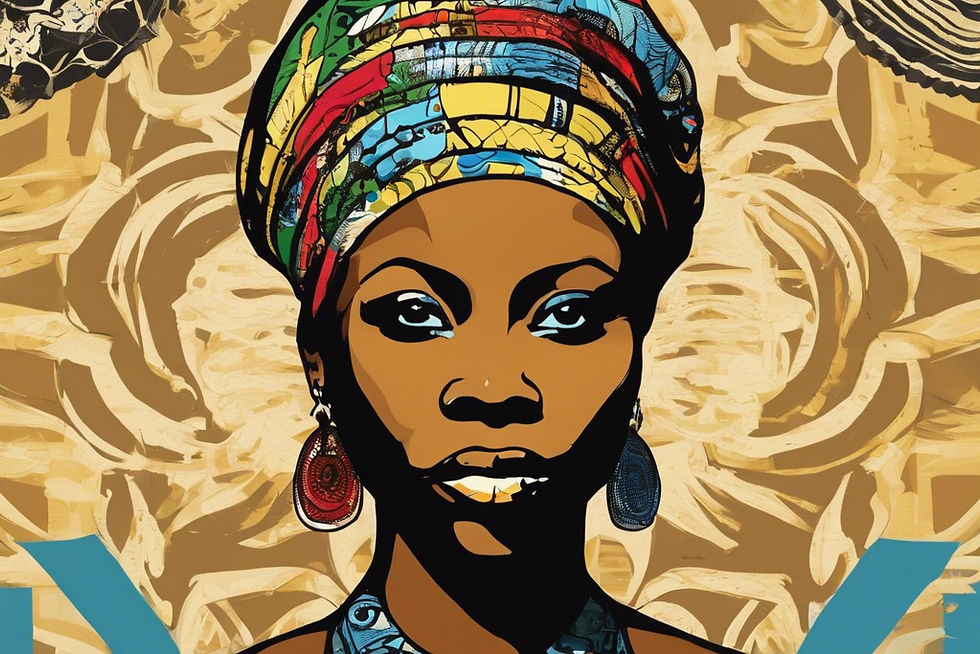The Living Presence of the Ancestors
- Alaje Fadesiye

- Apr 11, 2024
- 4 min read
Updated: Aug 20, 2025
In our tradition, to honor the ancestors is to honor the very roots of life. The ancestors — Egún — are the first spirits we salute in prayer and ritual, for they are our closest companions in the unseen world. A proverb of Ifá teaches:
“Àwọn tí ó kú, kò kú pátápátá; wọ́n ń gbé nínú ọkàn àwọn tí ó yé.”“Those who have died never truly die; they live in the hearts of those who remain.”
Another Odù, Odu Oyeku Méjì, reminds us:
“Ìbá Egún, kí n tó bọ Òrìṣà.”“Honor the ancestors before you worship the Òrìṣà.”
This truth binds us across lands and generations. The ancestors clear the way, strengthen us in hardship, and ensure that our offerings to the divine are received.
Why the Ancestors Come First
The dead are not distant. They remain bound to us by blood, lineage, and destiny. In Yorùbá understanding, the ancestors are invested in our lives — guiding, protecting, correcting. When we honor them, we affirm that our lives are continuations of theirs.
Ifá teaches in Oyeku Méjì:
“Okú ò níí jẹ́ kó lọ; ẹni tó bá gbàdúrà sí Egún, àláfíà ló ní rí.”“The dead will not let one go astray; whoever prays to the ancestors finds peace.”
But if they are forgotten, they may send dreams, confusion, quarrels, or even illness as a warning. Neglect is like turning your back on your own foundation — and a stool without a base cannot stand.
Creating a Sacred Seat
To raise a shrine is to give the ancestors a seat among the living. This need not be elaborate; sincerity matters more than appearance. A quiet space is chosen — a corner of the home, a secluded spot outdoors, or at the foot of a strong tree. The shrine is for ancestors only, not for Òrìṣà or for spirit guides.
Sacred items may include:
Water (omi tútù) — poured in libation for coolness and clarity.
Light — candles to illuminate the path of the dead.
Food and drink — a portion of the family meal, fruits, coffee, rum, or whatever the ancestors enjoyed.
Ancestral staff (Òpá Egún / Ìgi Egún) — tapped to summon or dismiss them.
Symbols of lineage — heirlooms, photos, or objects carrying family memory.
Some mark the space with sacred chalk (efun, cascarilla), others with vessels of water or a white cloth. Whether simple or adorned, the essence is one: the ancestors are invited to dwell in our midst.
Daily and Weekly Devotion
The shrine is alive through devotion. Each day, we approach with humility:
Morning libation — water is poured, the staff tapped, and the names of Egún spoken.
Prayer — gratitude is expressed from the heart, or formal invocations are made. A simple line from Ìbá Egún is:
“Ìbá gbogbo Egún, mo kí yín, ẹ má bínú sí mi, ẹ má ṣàì gbà mí l’áyè mi.”“Homage to all ancestors, I greet you; do not be angry with me, do not fail to support me in my life.”
Offerings — the first portion of food is placed on chipped plates, drinks are given, and flowers or fruits are refreshed.
Care — water is changed daily, offerings removed respectfully, and the space kept clean.
Through divination or dreams, the ancestors may reveal their desires: a favorite food, a special prayer, or a ritual to be performed. Listening to these messages deepens the bond.
Communal Ancestral Rites
The honoring of ancestors is not only private but communal. In Yorùbáland, the great Egúngún festivals bring the spirits to life in masquerade, blessing the entire town with protection and abundance. In the diaspora, ancestral drumming, feasts, and yearly memorials continue the same spirit of joy and reverence.
In both personal and collective rites, the ancestors teach that death is not an end but a transformation — a movement into another form of life.
The Spiritual Meaning
To honor Egún is to walk in alignment with destiny (ayànmọ̀). They strengthen our orí (inner head), protect us from misfortune, and intercede so that our lives may flourish.
A proverb says:
“Tí a bá gbàgbé orí itẹ̀, a máa ṣubú.”“He who forgets the base of the stool will fall.”
Just as the stool cannot stand without its base, no one can stand strong in life without honoring their ancestors.
One Tradition, Many Expressions
Across the ocean, outward forms adapted, but the essence remained unchanged. In Yorùbáland, families honored their ancestors at gravesites, compounds, and sacred trees. In new lands, water, candles, and chalked circles became the markers of ancestral space. Yet wherever the shrine appears, its voice is one:
Egún are first.
Egún are fed.
Egún walk with us.
Conclusion
The ancestors are never gone; they live wherever they are remembered. To build their shrine, to pour libation, to call their names, is to weave their presence into our daily lives. In return, they bless us with guidance, protection, and strength.
This is why we honor them first — not as the past, but as living roots. For if we stand tall today, it is only because we stand upon their shoulders.



Comments